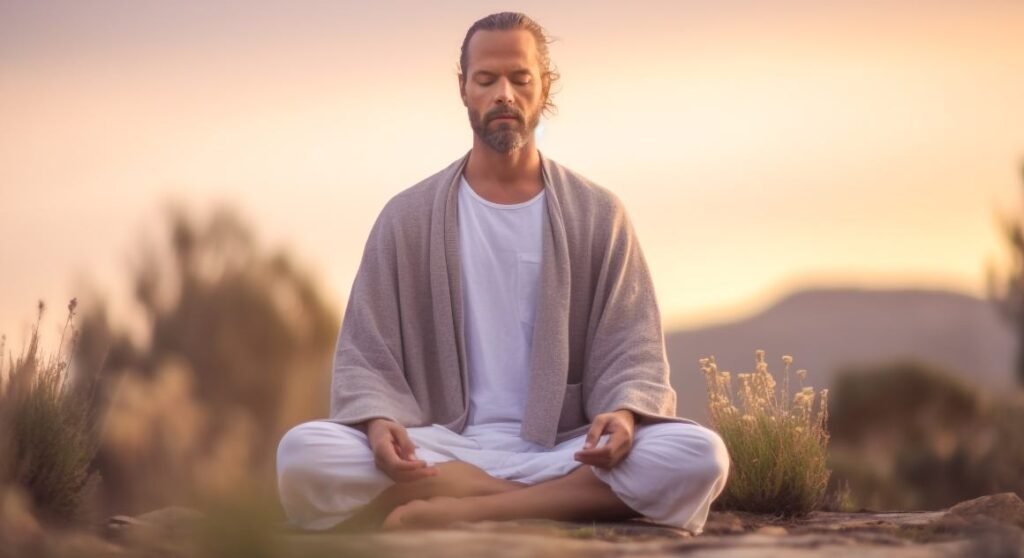Mediation is an ancient practice that has been practiced for centuries. It improves mindfulness, calmness, and mental peace. Starting a meditation exercise can seem inspiring and exciting for beginners, but it becomes a satisfying experience with good mentoring. This article provides important tips to help beginners understand and feel easily involved in meditation.
1. Start with the Right Mindset
The first and most important thing to keep in mind is that meditation is not about getting perfection. Many beginners need to remember that they do not need to achieve the state of light even in the start after some days or months. In reality, this is the fact is meditation means to become aware of your thoughts, feelings, and senses without adjudgment. It is a normal matter that there will be thoughts during the meditation. And it is important how you react towards your thoughts.
Tip: Start each meditation with an open mind. You should not expect any result. Trust in the process and you will grow over time. Starting the meditation means starting the journey of peace of mind.
2. Choose a Comfortable Space
A right environment is very important for the mediation. This is especially true for beginners. An environment, peaceful and silent is very helpful for creating the ideal setting for focused mind in meditation. The mind can be distracted by noise and uncomfortable seating positions in meditation.
Tip: Pick a corner in the room of your home. In this corner you can sit undisturbed. For setting you can choose a chair on a cushion so that you feel comfortable. And dim light will feel relaxed.
3. Set Small, Achievable Goals
At first starting meditation, it is important to comfort yourself into it. Trying to meditate for 30 minutes or longer can make you frustrated. Shorter sessions can lead to make happy.
Tip: Start meditation with a 5-to-10-minute session. And gradually increase the gradually increase the duration for more comfortable sessions. Meditation for a few minutes in each day is more helpful than an hour-a-week session.

4. Focus on Your Breath
Breathing is at the heart of meditation practices. Focusing on your breath helps anchor your mind and body in the present moment, making it easier to let go of distractions.
Breathing is very essential in meditation practice. Focusing on your breath helps to strengthen your mind and body
Tip: As you meditate, focus on your breath as it flows into and out of the body. If your minds start to wander, gently bring focus to the breathing without any nervousness. Deep breathing makes our mind and body relax.
5. Don’t Fight Your Thoughts
At first time it is normal to wonder your mind, especially when you start meditation at first time. For many meditators it become not easy to stop wondering thoughts. In meditation there is not any need to force your mind to empty about the thoughts. But there is need to focus our mind gently to the present.
Tip: When the mind starts breathing thoughts simply focus on them gently. And there should not be any judgment about the thoughts. Let them pass them in the mind like the cloud in the sky. Further, start again your meditation and focus on breathing.

6. Explore Different Meditation Techniques
There are many types of meditation, and as a beginner, it’s worth exploring different techniques to find what resonates best with you. Some popular types include:
Mindfulness meditation: Focuses on being fully present and aware of your thoughts, feelings, and sensations.
The field of meditation is like a different tree garden. Where there are different fruit trees. Hence likewise in the field of meditation, there are different techniques. And there is a need to choose the meditation technique that mostly fits your personality.
A. Mindfulness meditation: In these techniques focus on being fully present and knowing the thoughts, feelings, and sensations in your mind.
B. Loving-kindness meditation (Metta): This type of technique creates feelings of compassion and kindness toward yourself and others.
C. Body scan meditation: This technique involves slowly scanning your body for tension and releasing it as you focus on each body part.
D. Mantra meditation: This technique involves in reading a word or phrase to focus the mind.
Tip: These are different meditation techniques. All the meditation techniques are good. But as a beginner lets test which technique works well for you.
7. Practice Patience and Self-Compassion
As any new skill demands for the person to be patient and keep practicing. It is possible to become frustrated if you expect more from this meditation practice
Tip: Practice meditation with self-awareness and a sense of fulfillment and curiosity. Celebrate each small progress in your meditation. If your minds sit still for a minute or you notice that you notice your mind starts to wonder.
8. Create a Routine
For regular practice of meditation will help to improve the quality. The mind will accept it as a routine work. As a result, definitely it increases the good effects of meditation.
Tip: Fix a specific time each day for your meditation practice. It could be a morning or evening. Some people prefer mooring to start the day with more peace of mind and some people feel enjoyment at night. What suits your lifestyle keep it in your daily routine.
9. Use Meditation Aids if Needed
Some beginners find it helpful to get help from any digital aid in their meditation practice. This aid could be any guided meditation, music for meditation, app for meditation to make it easier. This type of help is benefitting its make supportive because there is step-by-step instruction for the mediations.
Tip: Test for your meditation app like Headspace or Insight Timer. These apps offer a variety of guided instructions for meditations.
10. Track Your Progress
Meditation is an interesting journey. And keep tracking your progress can be a motivation factor over time. For this purpose, you can keep a journal and note how often you practice meditation. It will help to reflect on the progress of meditation.
Tip: After each session of meditation write dawn about your feelings during meditation. What distraction arose or any insight you got.

11. Incorporate Mindfulness into Daily Life
Meditation is not only sitting silently with closed eyes. You can bring mindfulness into every activity in life like walking, eating even small things like house chores.
This activity helps you to be present in the moment and stress-free in your daily life.
Tip: In daily activities choose one activity it can be any activity like writing an email or talking with a colleague eating a meal attention to only that activity, and practice mindfulness.
12.Stay Open to the Benefits
Meditation has physical, emotional, and psychological benefits. By doing daily meditation it helps to enhance focus power, increase emotional intelligence, and improve the overall well-being of a person. However, all these benefits could grow with time.
Tip: Start meditation with a feeling of happiness in your heart and mind. All the changes in the personality may occur slowly and gradually. There should be consistency in meditation for getting benefits.
Conclusion
At the start of meditation practice can feel uneasy, but with a positive mindset, it becomes a life-changing journey toward inner peace. By focusing some basic things would be beneficial. There should be a comfortable environment, achievable goals, and sympathetic toward yourself. All these things will make a strong foundation for a successful meditation practice. Remember mediation is a purely personal exercise. There is no wrong or right way to do it. Only is the key to staying willing, Kee patient, and committed to your journey of meditation.




